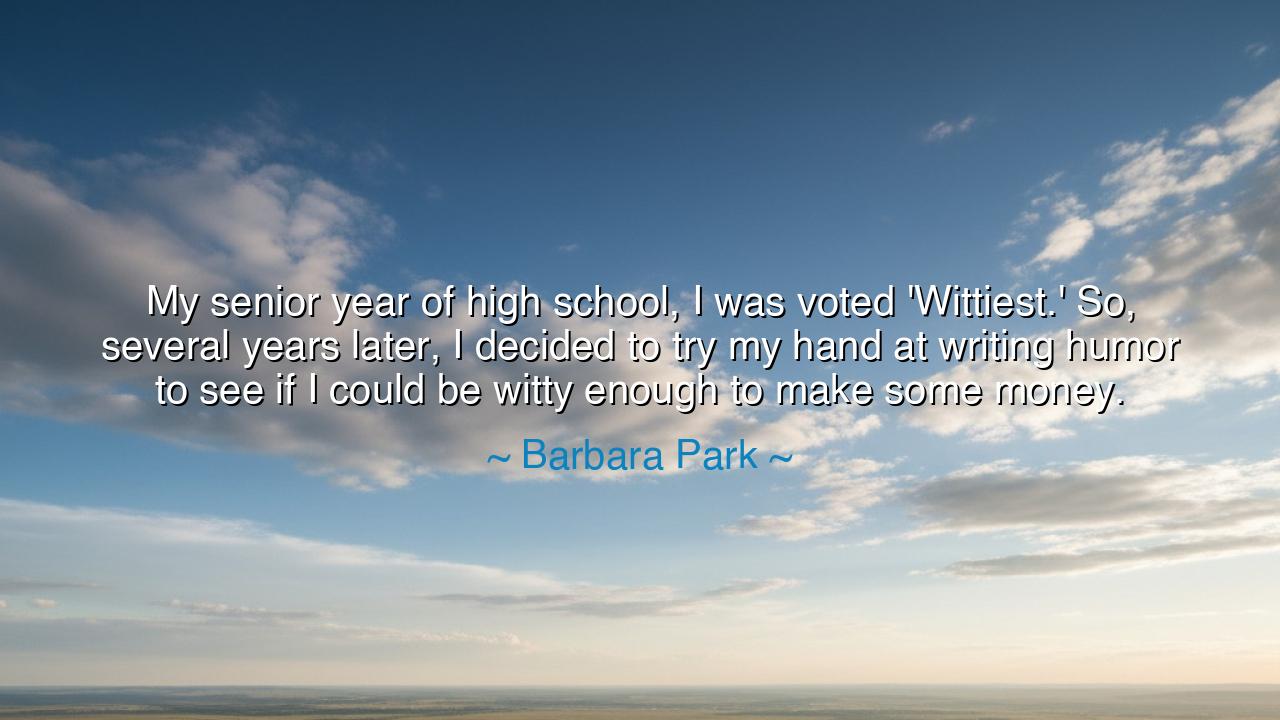
My senior year of high school, I was voted 'Wittiest.' So
My senior year of high school, I was voted 'Wittiest.' So, several years later, I decided to try my hand at writing humor to see if I could be witty enough to make some money.






In the warm and reflective words of Barbara Park, creator of the beloved Junie B. Jones series, we hear not just humor, but a deeper story of self-discovery and courage: “My senior year of high school, I was voted ‘Wittiest.’ So, several years later, I decided to try my hand at writing humor to see if I could be witty enough to make some money.” Beneath the charm of this remark lies a timeless truth — that the gifts we carry within us in youth, if nurtured with patience and purpose, can become the labors of a lifetime. It is a story as old as art itself: that the small sparks of our nature, if tended with care, can become the steady flame that lights our path.
To be called witty in one’s youth is often a passing compliment, a recognition of quickness, of sparkle, of the mind’s agile dance. But Barbara Park, with the discernment of the wise, looked beyond the laughter to see in that wit a seed — a calling waiting to be awakened. She transformed the lightness of humor into a craft, turning what once was a high school jest into a lifelong vocation. Her journey reminds us that destiny often speaks first in whispers, in the small praises or talents that others see in us before we ourselves believe them real.
The ancients, too, knew that the roots of greatness often lie in the playfulness of youth. The philosopher Aristotle once said that the child at play is often the father of the man — meaning that the passions of our early years, when guided by wisdom, become the tools of creation. Just as the sculptor Phidias once molded clay as a boy before shaping marble for the Parthenon, or how Leonardo da Vinci’s sketches of curious machines became the foundation of art and invention, so too did Barbara Park’s early wit become the foundation of her storytelling. What began as laughter among classmates blossomed into laughter among generations.
Yet Park’s quote also holds a lesson in humility and persistence. For it is one thing to be known as clever; it is another to make humor into art. Wit is like lightning — brilliant but fleeting. To capture it, one must have patience, wisdom, and heart. The young Barbara Park could have rested in the easy joy of being known as witty, but she chose to labor — to test her gift, to refine it, to turn it into something that could bring light not only to her own life but to others’. Her humor was not that of mockery or pride, but of empathy — the laughter that heals, the laughter that connects. In this, she walked the same path as the ancient jesters and storytellers, who used humor not as a weapon, but as a balm for the weary spirit.
In her own way, Park followed the same current that runs through the ages: the belief that laughter and wisdom are not opposites, but twins. For the most enduring humor — from Aristophanes to Mark Twain — is born not of frivolity, but of insight. It sees the absurdities of life not to ridicule them, but to reveal truth gently, through laughter’s forgiving light. Barbara Park’s Junie B. Jones books, filled with the innocent mischief of a child’s world, echo this same wisdom. Her stories teach without preaching, making young hearts wiser through joy.
Her words also teach a subtle courage: the courage to trust one’s gift, no matter how small or unconventional it seems. In a world that often values seriousness over humor, she dared to turn laughter into livelihood. It was an act of faith — not only in herself but in the power of joy as something sacred and worthy of pursuit. She reminds us that our talents, however humble, are not accidents. They are invitations. The wit that wins laughter in youth may one day become the wisdom that wins hearts.
So let this be the lesson: cherish your natural gifts, even the lightest of them. Do not scorn the talents that bring joy — for joy is holy. If your gift is humor, use it to heal; if it is speech, use it to uplift; if it is imagination, let it wander boldly. What begins as play may end as purpose. And when others laugh with you, remember, as Barbara Park did, that humor is not a lesser art, but one of the highest — for it unites the human spirit in the one thing all people share: the need to feel alive, seen, and lighthearted amidst the weight of the world.
Thus, from a young girl voted “Wittiest” came a woman who taught children to laugh, to learn, and to love themselves. In this we see the wisdom of ages — that destiny is often disguised as delight, and that the truest art is born when we listen to the earliest laughter of our own hearts.






AAdministratorAdministrator
Welcome, honored guests. Please leave a comment, we will respond soon